When it comes to operating a short-term rental business, knowing the law-making process is a must in adequately advocating for yourself, the industry, and your community. STR laws typically come in the form of an ordinance, a law made by a local government such as a city council or board of county commissioners. Given that the STR industry as we know it today is relatively new, STR regulations are constantly in flux and can differ from jurisdiction to jurisdiction.
This article is the written companion of our Summer 2022 RR Summit session Regulations 101: How They’re Made, Trends, + Ask a Policy Expert. Watch the session replay here >
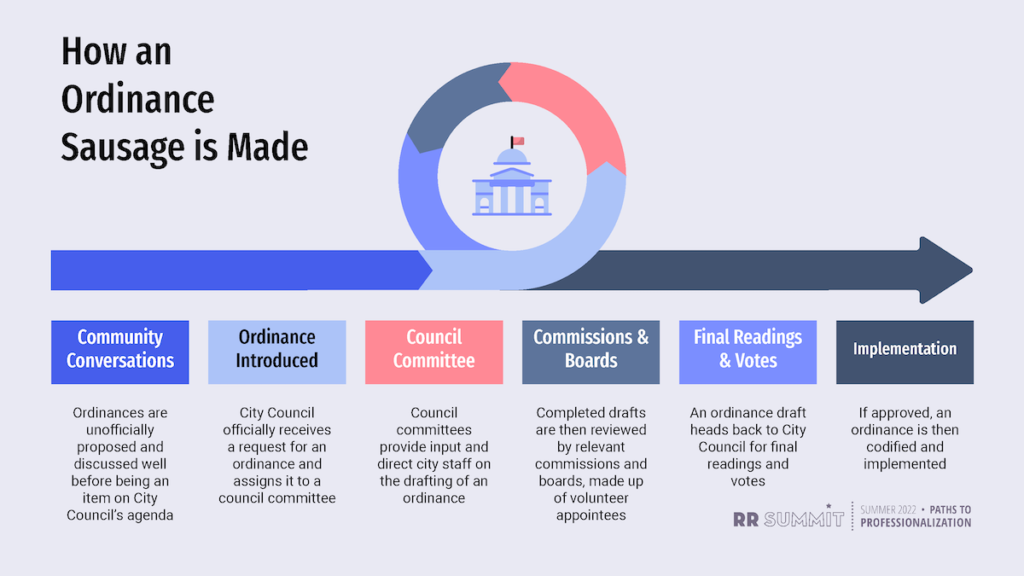
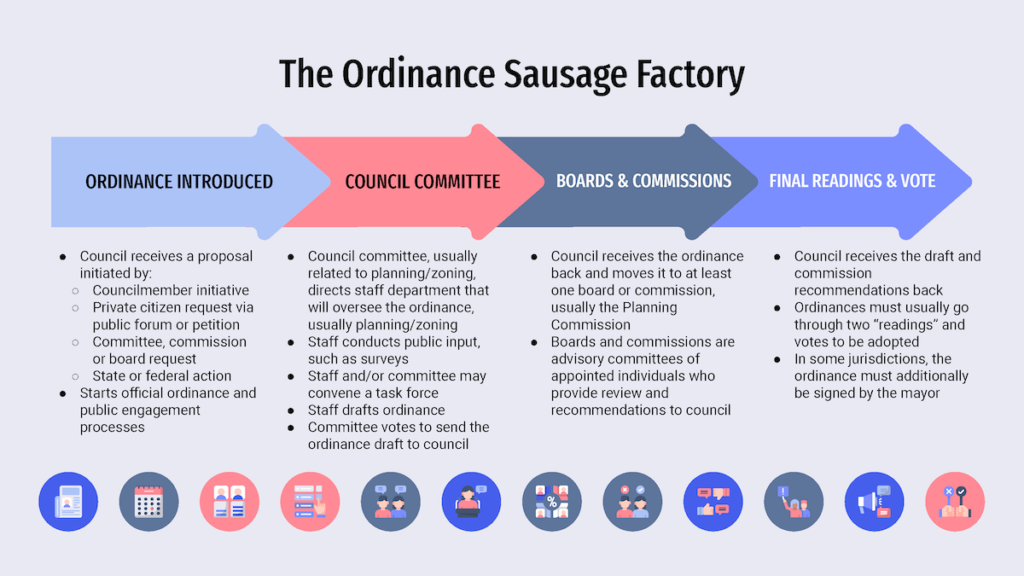
How short-term rental regulations are made: a messy process
The roadmap to making an ordinance can sometimes look like a tangled web. Long before a proposed ordinance ever appears on a City Council agenda, there are conversations about it happening in your community.
An ordinance can be introduced in a number of different ways. A council member might make the proposal, a private citizen or a group might request it through a formal process like a public forum or a petition, a committee or a commission might request it from the council, or state or federal action might direct city councils to take a certain ordinance action.
In the next phase, the City Council generally will refer the ordinance to a council committee or a task force. A council committee is a subgroup of council members possibly mixed with other non-councilmembers.
In the case of short-term rentals, the council committee will most commonly be the planning committee or zoning committee. Keep in mind that every city is different. Take a look at your local government to find out which committee would handle a STR ordinance.
A task force, on the other hand, is a temporary one-time group of people who are brought together only to look at this ordinance issue, discuss it, and provide recommendations, and then that group is dissolved.
City staff will work closely with council committees and task forces by researching the topic, providing information to members, conducting surveys, soliciting public input, and drafting a proposed ordinance based on the committee or task force’s recommendations.
Votes and decisions throughout the short-term rental ordinance process
The role of these council committees or task forces is to make recommendations to the City Council. It is purely advisory. However, the council committee or task force will “vote” on what recommendation to make. These votes are different from City Council votes in that they have no power to enact a law.
The draft ordinance may also go in front of a board or commission like the planning commission for a vote on whether to recommend the draft ordinance to council. They may vote to recommend that city council pass it as is, pass it with amendments, or not pass the ordinance.
The draft ordinance, with or without revisions, is then formally presented back to the City Council along with any recommendations that have come from respective groups in the process.
Then the ordinance must go through a series of what cities call readings, which are separate votes on separate dates to adopt the ordinance. City councils typically require one to three readings, depending on the jurisdiction. At each reading before the final vote, there is an opportunity for the public to give feedback and for the council to revise the ordinance in some way.
At each reading, there is an opportunity for the public to give feedback on the proposed ordinance and for revisions to be made. There is even the possibility that the draft ordinance will be sent back to the starting point to go through the entire process again until the City Council has an ordinance they’re satisfied with.
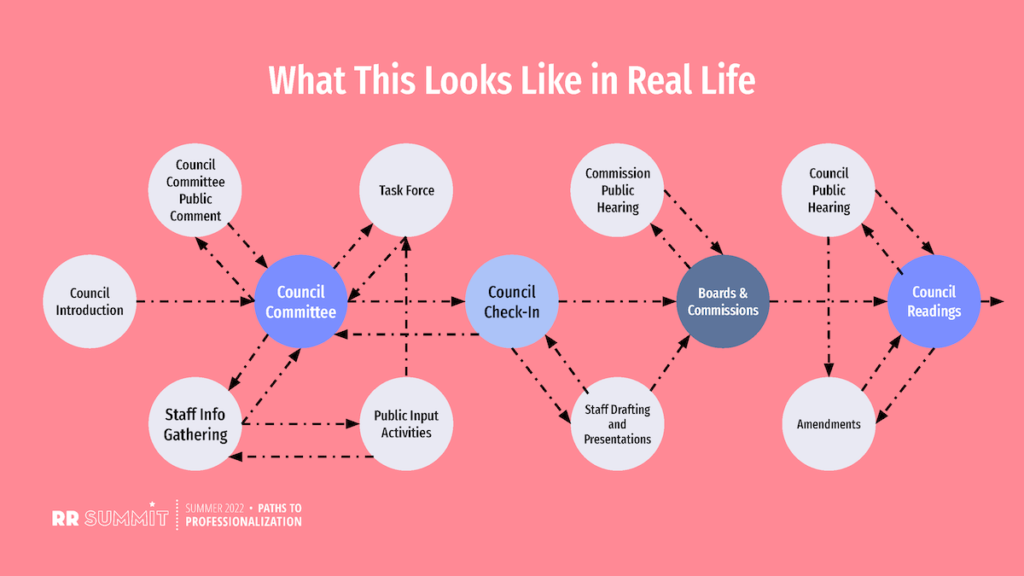
“It’s not a linear process,” said Alexa Nota, COO of Rent Responsibly, “but as long as you’re familiar with this, generally, it makes it a lot easier to follow along.”
In some cities, the final reading means the ordinance is adopted as law. In other cities, the ordinance needs the mayor’s signature to be finalized. The mayor might also have veto power, depending on the city.
An adopted ordinance will move forward to implementation and enforcement. Implementation is often a long process, sometimes longer than the ordinance development process was.
Public engagement from STR hosts and property managers is required
Public feedback is a mandatory part of the ordinance-making process. There will be multiple opportunities and methods of sharing your input, including speaking at a public hearing or submitting written comments, and participating in surveys.
As an STR operator, it’s crucial to be involved in the public input process.
“If you leave this conversation only to the people who don’t know and don’t like short-term rentals, we’re going to end up with a not great outcome,” Alexa said.
Each city and state has its own rules for a minimum number of public hearings throughout the ordinance process, how far in advance agendas and public notifications must be published before meetings, and how long an ordinance process can last.
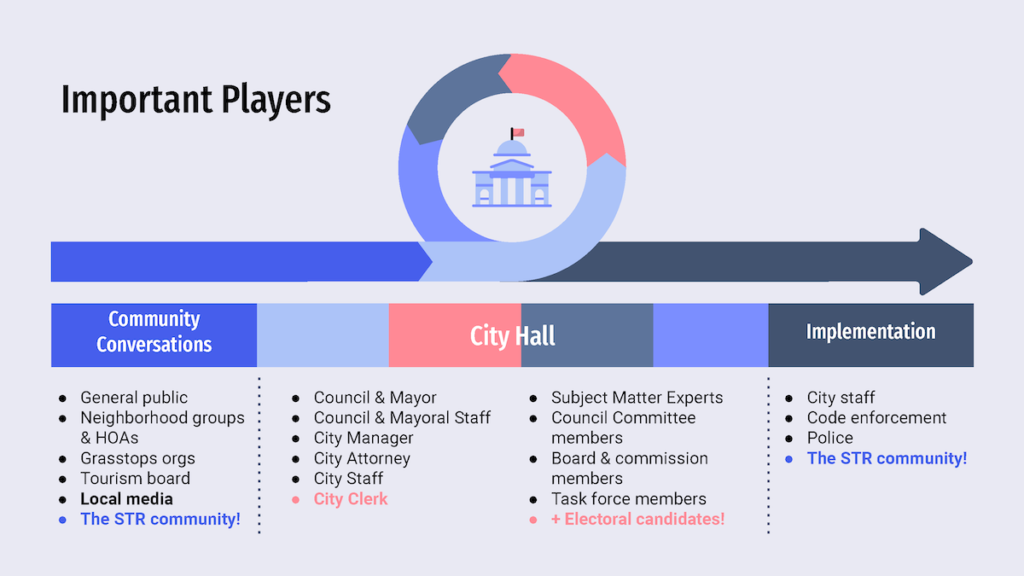
Key policy decision-makers and people to know
Legal language and frequent changes in an evolving ordinance can be confusing. Reach out to someone who can explain any changes (amendments) made to the ordinance. Make sure you have a copy of the most recent iteration of the ordinance from your city clerk.
While it’s important to know your elected officials, city manager, city attorney, and city department staff, the city clerk might very well be your best friend in the ordinance-making process.
The city clerk is the keeper of all the important information and is often more up to speed on the ordinance than other people at City Hall. They also can help you navigate the city website and show you how to find important documents and information.
Also, become familiar with leaders of your community’s neighborhood groups and homeowners associations, grassroots organizations like chambers of commerce, different associations like your local REALTORS association, and your tourism board. Local media also is part of the ordinance-making conversation, because they are responsible for disseminating this information.
Support pro-STR candidates
Make sure you know when city council members are up for reelection and any candidates who might be vying to fill their seats during the next election.
“As this process plays out, the elected officials in these positions turn over. So you always want to be paying attention to who is on your council now that is fighting to retain their seat, who on your council will be leaving and who might replace them,” Alexa said.
Remember that an STR ordinance is not a “closed-loop, one-time process,” Alexa said. “It is one that continues over and over until the end of time. So every few years, you’re going to be going through an ordinance process or an update or something like that. Just be ready for it and have the courage to face it.”
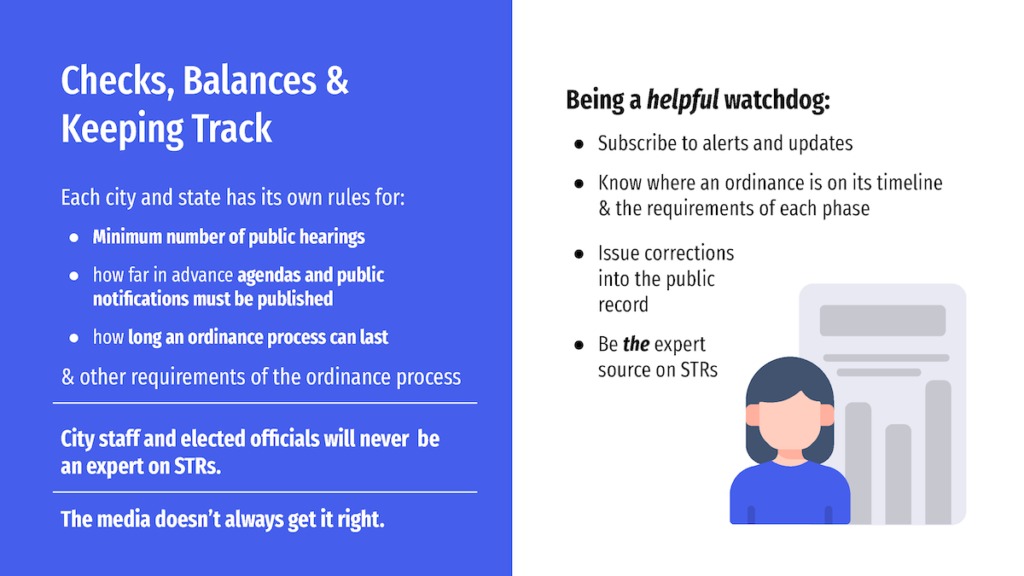
Be the STR expert
City staff and elected officials will never be experts on short-term rentals.
“They don’t know short-term rentals like you do,” Alexa said
The same is true for members of the local media. As you go through the ordinance-making process, try to be a helpful watchdog for elected officials, city staff, and journalists.
“If you come across something in all of this where somebody’s gotten something wrong, don’t attack your council, don’t attack your mayor, don’t attack your reporters,” Alexa said. “That’s never going to work; it’s always going to backfire. But when you have something that needs to be corrected, make sure that you’re entering those corrections and issuing those corrections into the public record.”
That can mean making a comment about it during a public hearing at City Hall. Likewise, if the media publishes or broadcasts content that’s incorrect, set the record straight and request a correction or clarification.
“It’s your role to be the expert on short-term rentals,” Alexa said. “Show people the truth about short-term rentals and how they can benefit communities when they’re managed well.”

•••
SUBSCRIBE TO GET UPDATES



